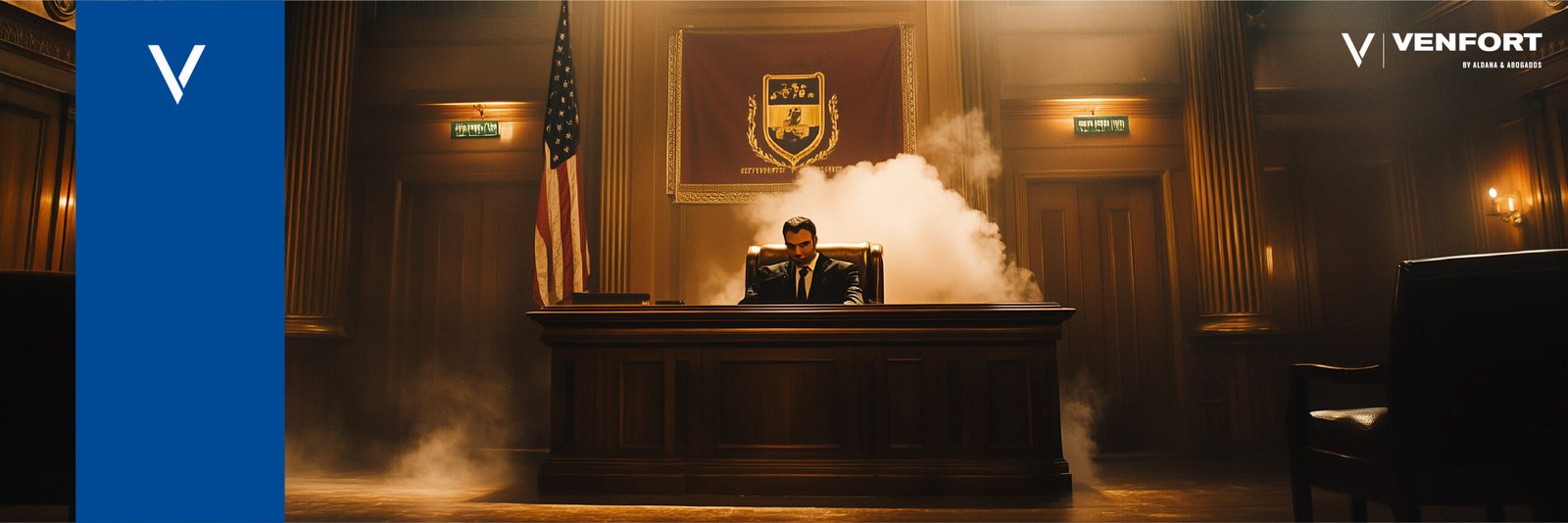Background of the decision (Venezuela Case I)
The Appeals Chamber of the International Criminal Court (ICC) issued a landmark decision on August 1, 2025 ordering Chief Prosecutor Karim A.A. Khan to recuse himself from Situation Venezuela I. This measure was adopted after confirming a potential conflict of interest arising from the personal and professional relationship between Khan and attorney Venkateswari Alagendra, who is part of the legal team representing the Venezuelan State before the ICC. Specifically, the Chamber determined that Khan is married to Alagendra's sister, and that he was also her superior in previous cases before the ICC (such as the defense of then Kenyan Vice-President William Ruto and Libya's Saif al-Islam Gaddafi). These family and work ties give rise to objective doubts about the Prosecutor's ability to act with full impartiality in the Venezuela I case.
The Appeals Chamber's decision was in response to a recusal request filed by the Arcadia Foundation (an NGO focused on human rights in Venezuela), which alleged precisely that the family and professional relationship between Khan and Alagendra could compromise the appearance of independence of the Prosecutor. While a first similar request had been dismissed in February 2025, the Appeals Chamber -acting as the ultimate guarantor of the integrity of the proceedings- reconsidered the matter and finally concluded by a majority that Khan's participation in the Venezuela I investigation would pose a risk to confidence in the ICC's impartiality. Accordingly, Karim Khan was ordered to formally present his excuse within three weeks, failing which the Chamber itself would take "other legal steps", including his forced removal from the case.
Legal Basis: Article 42(7) of the Rome Statute and Rule 35 of the RPP
The recusal order against Prosecutor Khan is based on express provisions of the Rome Statute (the founding treaty of the ICC) and its Rules of Procedure and Evidence (RPE). In particular, Article 42(7) of the Rome Statute provides that "neither the Prosecutor nor a Deputy Prosecutor shall participate in any matter in which his or her impartiality might objectively be called in question for any reason." It further provides that the Prosecutor "shall be excluded from the case" if there are grounds for incompatibility, such as having previously been involved in the same or a national case involving the same person under investigation. This provision seeks to ensure the absolute independence and objectivity of the ICC Prosecutor in every action, avoiding even the appearance of partiality.
Rule 35 of the RPP develops the procedure for these situations, imposing a duty to excuse. This rule provides that, if a judge, the Prosecutor or a Deputy Prosecutor notices the existence of a ground for recusal against him/her, he/she must communicate it and abstain from participating in the case. Alternatively, it also empowers the parties to the proceedings (or other members of the Court) to request the recusal of that official if they consider the lack of impartiality to be well-founded. In all cases, the final decision rests with the competent Chamber (in this case, the Appeals Chamber), which will evaluate whether the alleged personal, professional or hierarchical relationship affects - or may affect - the actual or perceived impartiality of the official involved.
Applying these standards, the Appeals Chamber concluded that there was "sufficient reason to believe" the existence of a conflict of interest warranting the recusal of Prosecutor Khan. The judges emphasized that a fair-minded and reasonable observer might fear a lack of objectivity, given that the familial, professional and even hierarchical relationships between Khan and Alagendra "are so interrelated that they cannot be ignored or minimized." Procedurally, this constitutes grounds for recusal under the Rule 42(7) standard and triggers the Rule 35 mechanism, which requires the removal of the affected official to preserve the integrity of the proceeding. For this reason, the order was clear: Karim Khan must recuse himself from the Venezuela I case, submitting his formal excuse to the Court within the indicated period.
Conflict of interest: reasons and scope
The identified conflict of interest lies in the fact that the person most responsible for investigating the alleged crimes in Venezuela shares close ties with members of the defense of the state under investigation. In this case, lawyer Venkateswari Alagendra is not only Khan's sister-in-law (sister of his wife), but has also worked under his direction in several previous cases. Notably, both were part of defense teams in high-profile international criminal trials, such as representing the now Kenyan President William Ruto (when he was indicted before the ICC) and defending Saif Qaddafi in the Libya situation. These previous collaborations evidence a professional relationship of trust between Khan and Alagendra, which transcends the anecdotal and could raise legitimate doubts about the position of the Prosecutor vis-à-vis the Venezuelan representation at the ICC.
The central concern is that, even if Khan were acting in the best good faith, the "appearance of impartiality" is already compromised. In the realm of international justice (and most especially at the ICC, which is charged with cases of enormous political and humanitarian sensitivity), impartiality must not only be real, but also ostensible. This means that it is not enough for the Prosecutor to be impartial; it is essential that victims, those under investigation and the international community perceive objectivity at every step. Otherwise, it erodes confidence in the court and opens the door to challenges to the legitimacy of the process. Precisely for this reason, the Appeals Chamber stressed that allowing Khan to continue to lead the Venezuela I investigation could "undermine public confidence" in the independence of the ICC.
It should be noted that the Office of Public Counsel for Victims (OPCV) itself before the ICC had previously expressed similar concerns. In an opinion filed on April 15, 2025, the OPCV argued that the Court should act even on its own motion to examine the Prosecutor's possible conflict of interest in the Venezuela I situation, since impartiality "is not negotiable" and is above procedural formalities. This ethical-legal appeal emphasized that, in a situation as geopolitically and humanitarily sensitive as Venezuela, any shadow of bias in the Prosecutor's actions could seriously compromise the credibility of the Court. The Appeals Chamber's decision, by taking up these concerns, sets an important precedent: it demonstrates that the ICC is willing to take drastic measures to ensure its objectivity, even if it means temporarily removing one of its highest authorities.
Role of the Prosecutor's Office and continuity of the investigation
The ICC Office of the Prosecutor (OTP) is the body responsible for conducting investigations and prosecuting cases before the Court. It is headed by the Prosecutor and has one or more Deputy Prosecutors, as well as teams of professional prosecutors, analysts and investigators. In practice, investigations in different situations (countries) are usually distributed among specialized teams, often led by senior prosecutors or by the Deputy Prosecutors themselves, under the overall supervision of the Chief Prosecutor.
In this case, the separation of Karim Khan will not paralyze the Venezuela I investigation, since he had already been away from his functions for several months due to an internal investigation unrelated to Venezuela (an inquiry for alleged labor harassment). During his absence, the direction of the Prosecutor's Office has been in the hands of his two Deputy Prosecutors, the Senegalese Mame Mandiaye Niang and the Fijian Nazhat Shameem Khan, who continue to conduct all the situations under examination, including that of Venezuela. Alan Aldana, a lawyer accredited as defense counsel before the International Criminal Court, confirmed that "all investigations, including Venezuela I, have been taken over by the Acting Deputy Prosecutors, Nazhat Shameem Khan (Fiji) y Mame Mandiaye Niang (Senegal)The Court's decision to recuse the Chief Prosecutor, in accordance with article 42 of the Rome Statute, following the removal of the Chief Prosecutor for conflict of interest declared by the Appeals Chamber", should not alter the course and momentum of the proceedings in Venezuela.
Procedurally, if Prosecutor Khan submits his excuse as ordered by the Chamber (or if the Chamber ends up recusing him directly), it is foreseeable that one of the Deputy Prosecutors will formally assume the leadership of Situation Venezuela I. It is even possible that the Appeals Chamber will appoint an ad hoc Prosecutor for this specific case, although for now the preference was to grant Khan the opportunity to voluntarily recuse himself before considering other alternatives. In any scenario, the investigation will continue its course: this is the first ICC investigation in Latin America (it was formally opened in 2021) for alleged crimes against humanity committed in Venezuela since 2017 . The ICC had already decided in 2023 to resume such inquiry as it considered insufficient the efforts of the Venezuelan justice system to address those crimes . Now, with the added assurance that the investigation will be led by a Prosecutor with no questionable ties, the Venezuela I case will be able to move forward with greater solidity and legitimacy before all parties.
Conclusions: importance of the decision
The ICC's order that Karim Khan be excused from the Venezuela I case is a landmark in the practice of international justice, for several reasons. First, it reaffirms the principle of impartiality as a cornerstone of the international criminal process: not even the Chief Prosecutor is exempt from being accountable to that principle. The Court's institutional integrity is strengthened, sending a clear message that conflicts of interest that could tarnish the perception of justice will not be tolerated. This is critical for victims who clamor for an impartial investigation, but it also provides assurances to potential defendants: they will know that they will be subject to objective scrutiny, free from personal bias or undue influence.
Second, the decision demonstrates the ability of the ICC's own internal mechanisms to correct course and take preventive measures. The Appeals Chamber acted in its role as the "final arbiter" of challenges, interpreting the rules in a finalistic manner in order to fill a procedural gap and ensure a fair trial. This precedent could guide future situations where possible impartiality is in question: it is clear that the Court will prioritize public confidence in its mandate over any personal considerations.
Finally, in the specific context of Venezuela, the decision adds a new chapter to a process closely followed by the international community. Despite previous attempts by the Venezuelan State to halt the investigation by invoking the principle of complementarity (claiming that the national justice system would investigate the facts), the ICC has kept the case open. Now, with the Acting Deputy Prosecutors leading the case, several of the political or perception obstacles are neutralized. Those who are eventually indicted in this case - be they authorities, former officials or any individual - will be able to exercise their defense without the argument of bias in the ICC Office of the Prosecutor. In sum, the ICC reaffirms with this decision its unwavering commitment to impartial justice, guaranteeing both victims and those under investigation that the process will be conducted under the rule of law and objectivity.













